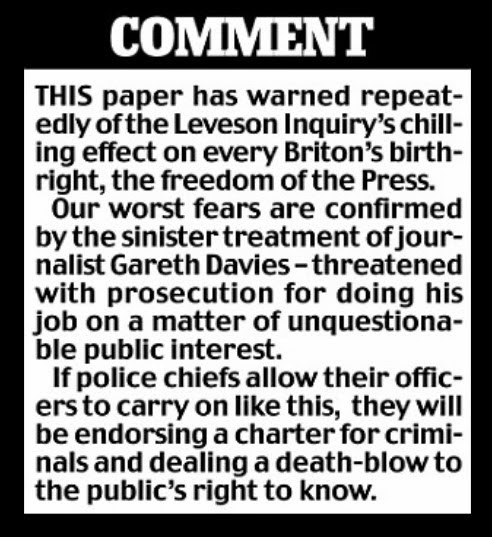The Times [£] in a leader: "Freedom of information is under attack. The truth is that there is no good time to weaken the FOI act and there is no good reason to. In the ten years of its existence it has become an essential bulwark of both government transparency and accountability."
John Fallon, Pearson’s chief executive, announcing the sale of the FT Group to Japanese media company Nikkei Inc. for a gross consideration of £844 million in cash: “Pearson has been a proud proprietor of the FT for nearly 60 years. But we’ve reached an inflection point in media, driven by the explosive growth of mobile and social. In this new environment, the best way to ensure the FT’s journalistic and commercial success is for it to be part of a global, digital news company."
Steve Bird, FT NUJ chapel FoC: "The FT chapel will do whatever it takes to protect jobs, employee rights and independent, quality journalism. We were all very concerned at the speed at which the deal seems to have been made. The chapel is now considering putting together a charter setting out our principles on editorial independence and working practices."
BBC director general Tony Hall in The Times [£]: "Some blame the BBC for the challenges that other media face in adapting to the internet age — but that is a challenge faced by media around the world, including places that do not have a BBC or anything like it. But I do want to look at how the BBC can help. We are already working more closely with local newspapers to link to stories and are exploring what more we can do by sharing content or paying them for reporting."
Peter Preston in The Observer on the Sun: "There remains an instinctive twitch of the forelock, even when Rupert Murdoch mounts the charge (as he’s done, occasionally, over the years). Yet sometimes the occasional sight of the old Dirty Digger, lobbing mini-missiles on to today’s Palace lawn, is both useful and salutary. It isn’t a secret that the wreck we used to call the Duke of Windsor was a profound national embarrassment. It isn’t a secret that conflicting views of the Nazis split polite society, that Churchill was no universal hero in the 30s – nor that the Windsors were a family divided. But tabloid treatment, putting the boot in hard, at least blows evasions away."
The Sun in a leader: "These images have lain hidden for 82 years. We publish them today, knowing they do not reflect badly on our Queen, her late sister or mother in any way. They do, however, provide a fascinating insight into the warped prejudices of Edward VIII and his friends in that bleak, paranoid, tumultuous decade. The rest of the Royal archive from that period, of similarly immense interest to historians and the public, is still hidden. It should be released."
Jim Chisholm in the Guardian: "To the modern media consumer, news relates to real-time traffic problems, restaurant reviews for that weekend, and available sex within walking distance."
The Times [£]: "Police forces have seized data from the phones of journalists or their sources twice in the past three months in blatant breaches of new rules on snooping...Officers used the heavily criticised Regulation of Investigatory Powers Act (Ripa) to acquire call and text logs without seeking judicial approval as specified in a new code of conduct outlined to parliament in March. One case was a leak inquiry to find a reporter’s police source."
NUJ general secretary Michelle Stanistreet in a statement: "Legislative changes on surveillance must include an independent and judicial process; journalists must receive an automatic and mandatory prior notification of requests to access their sources, materials and communications; and mechanisms need to be put in place so journalists and media organisations can challenge an application to access their sources with a robust right of appeal. There is no difference between the authorities asking for a journalists’ physical contacts book or footage and their telephone and communications records. The effect is exactly the same and the same legal safeguards must cover both."
Press Gazette reports: "The Investigatory Powers Tribunal heard that the Met Police press office provided the mobile telephone numbers of Sun journalists who had called in to check stories and ask for comments to investigating officers. Their phone records and telephone location data were then secretly accessed by police in order to identify confidential sources."
Kay Burley @KayBurley on Twitter: "@metpoliceuk press office - shame on you".
£=paywall




























